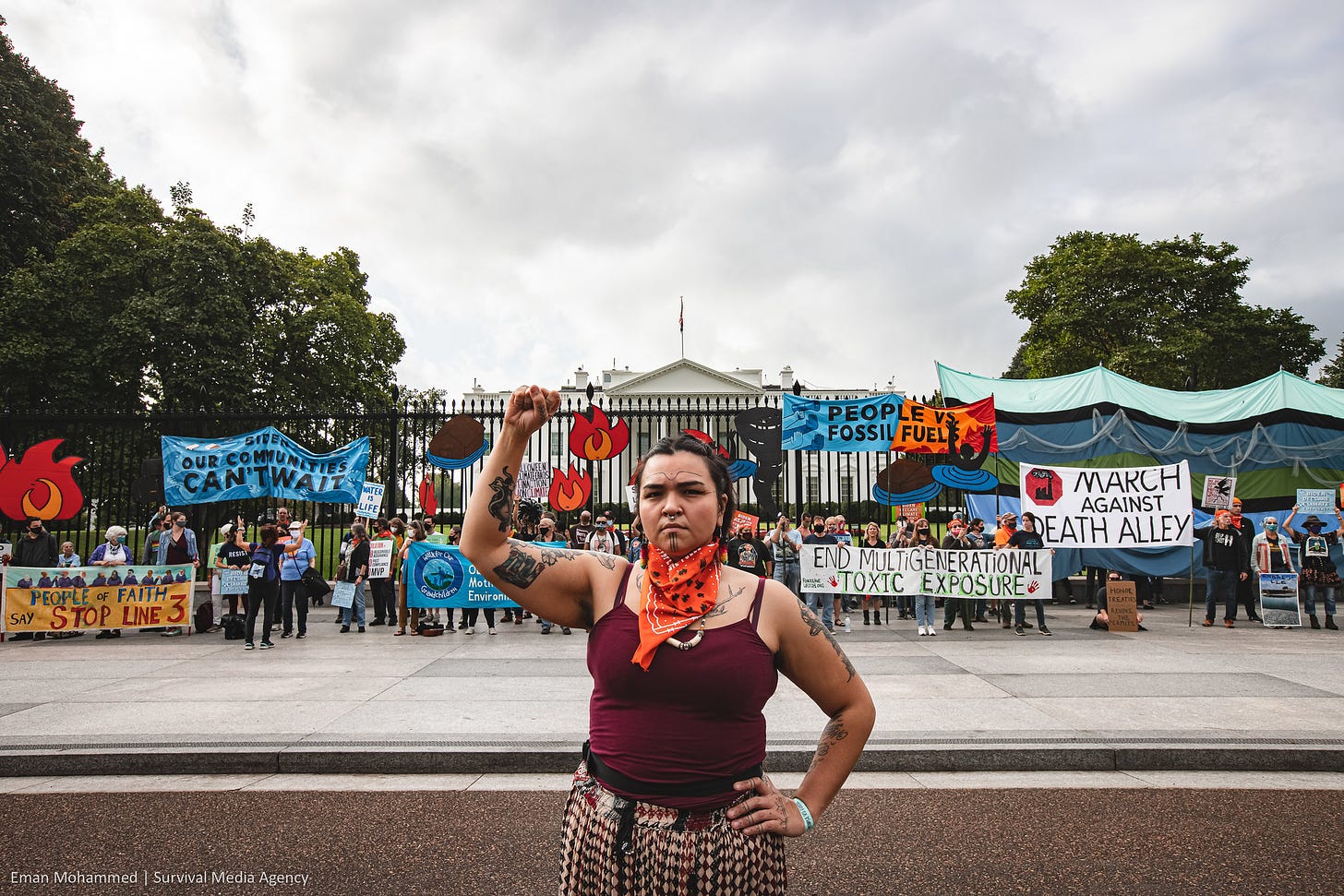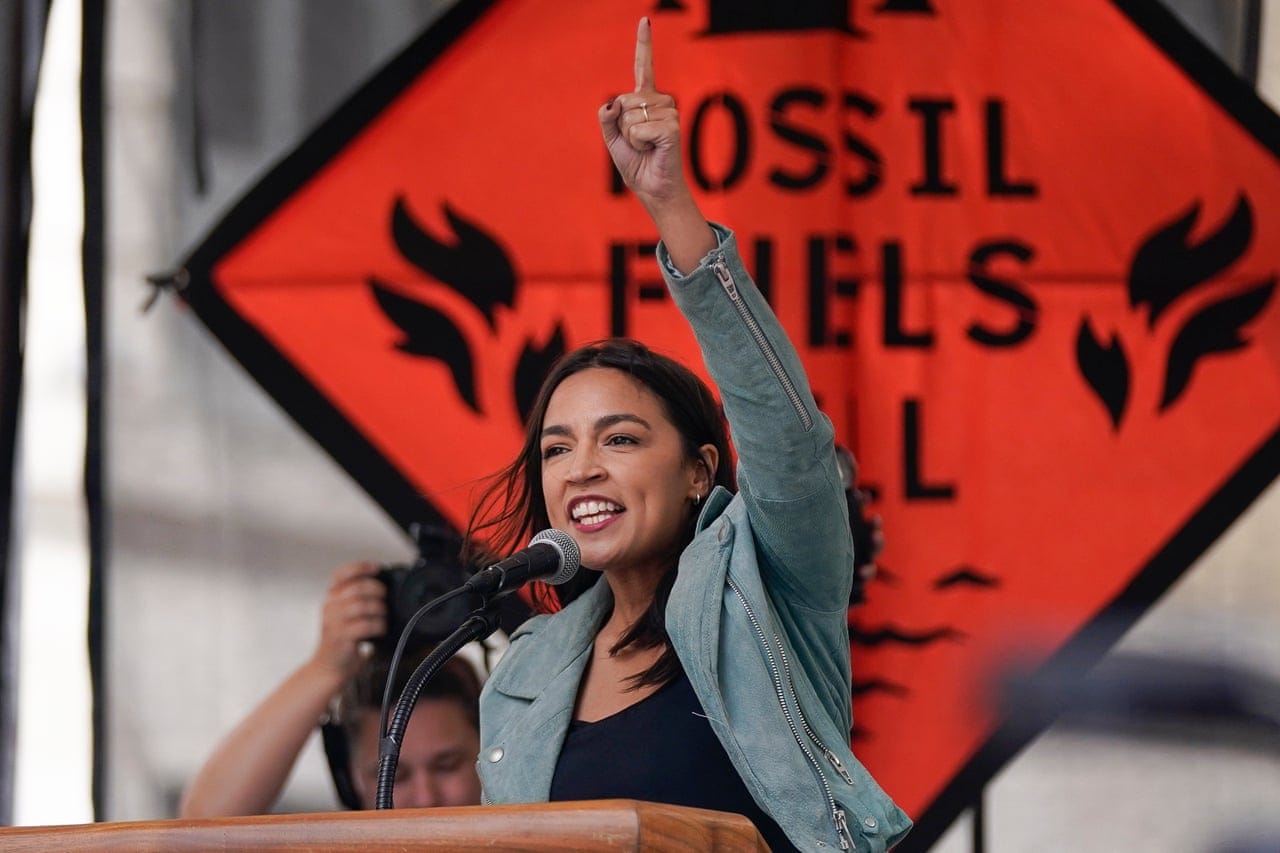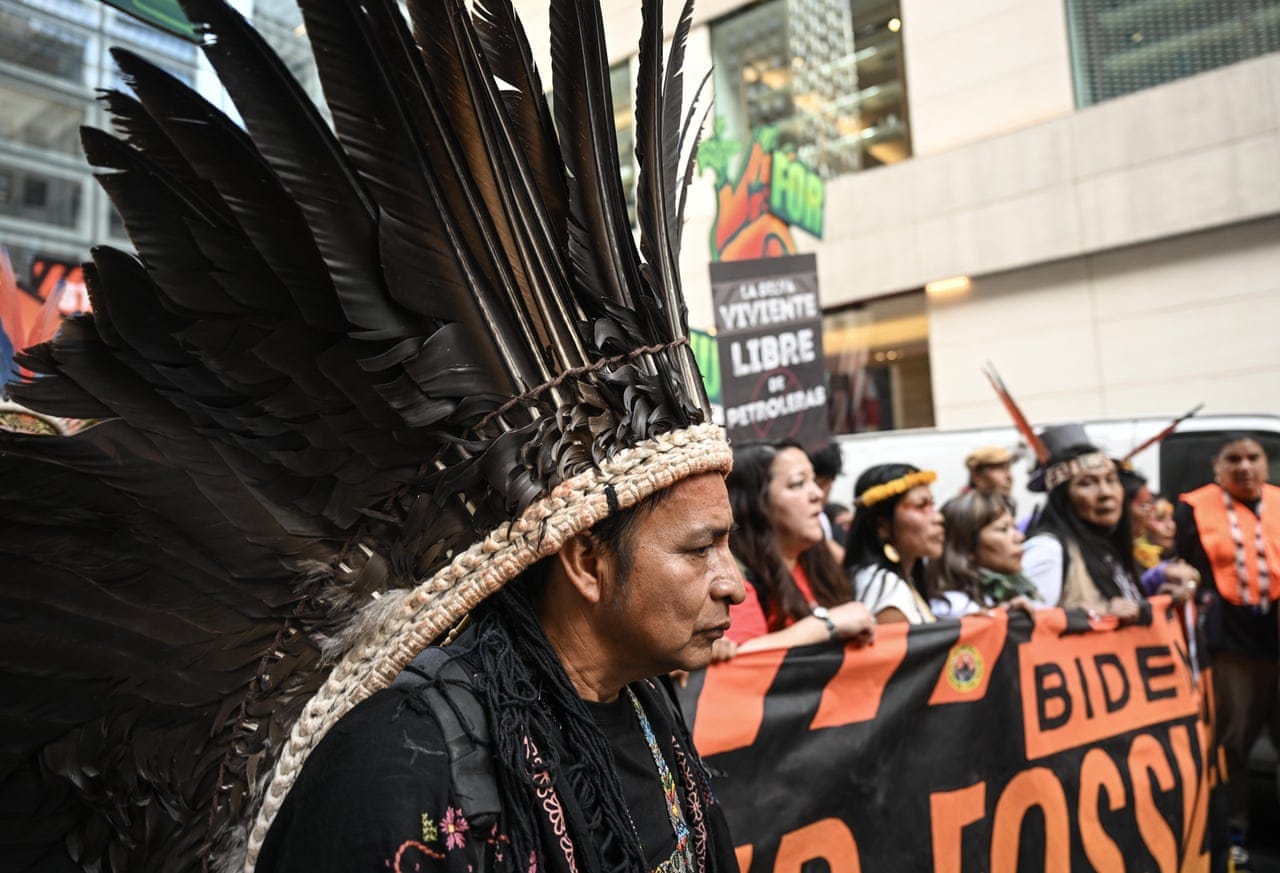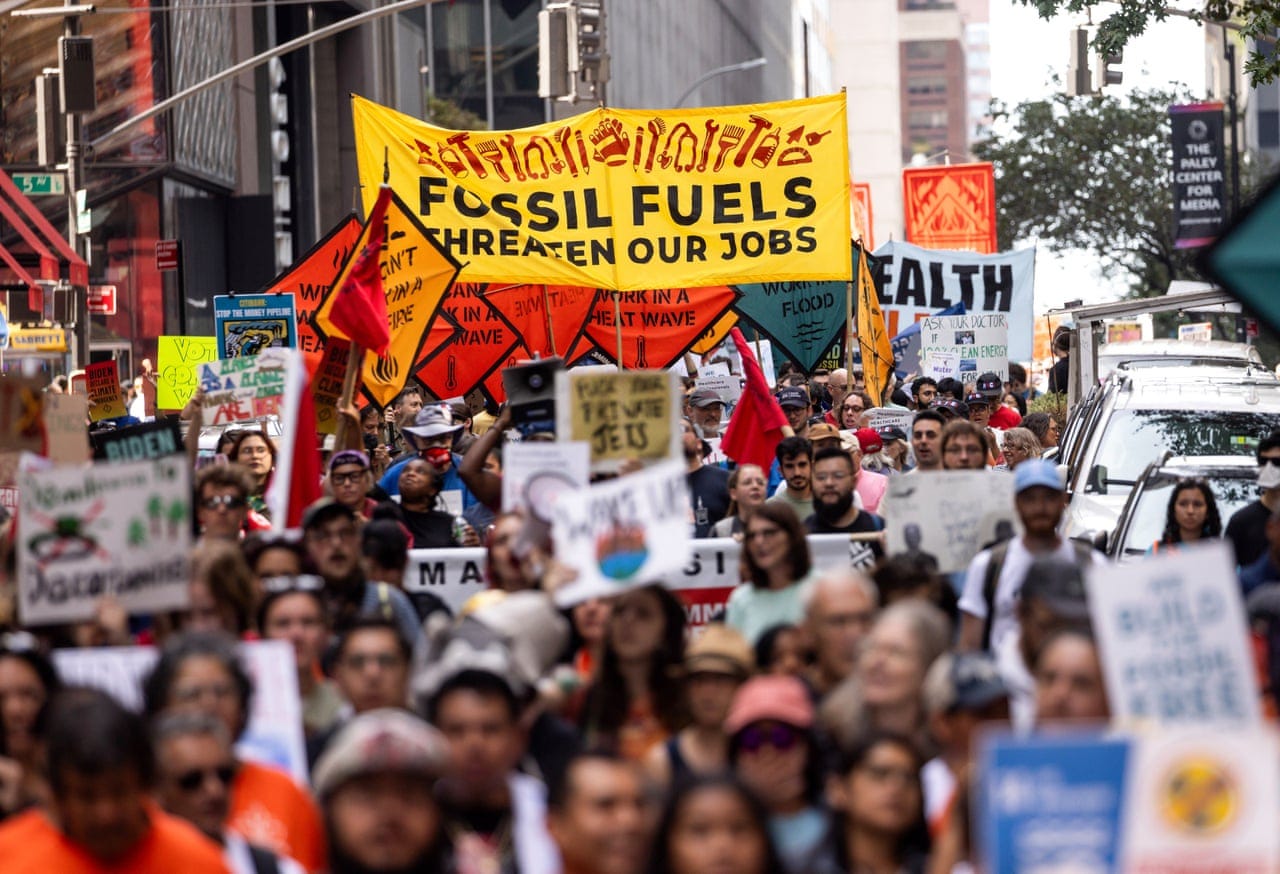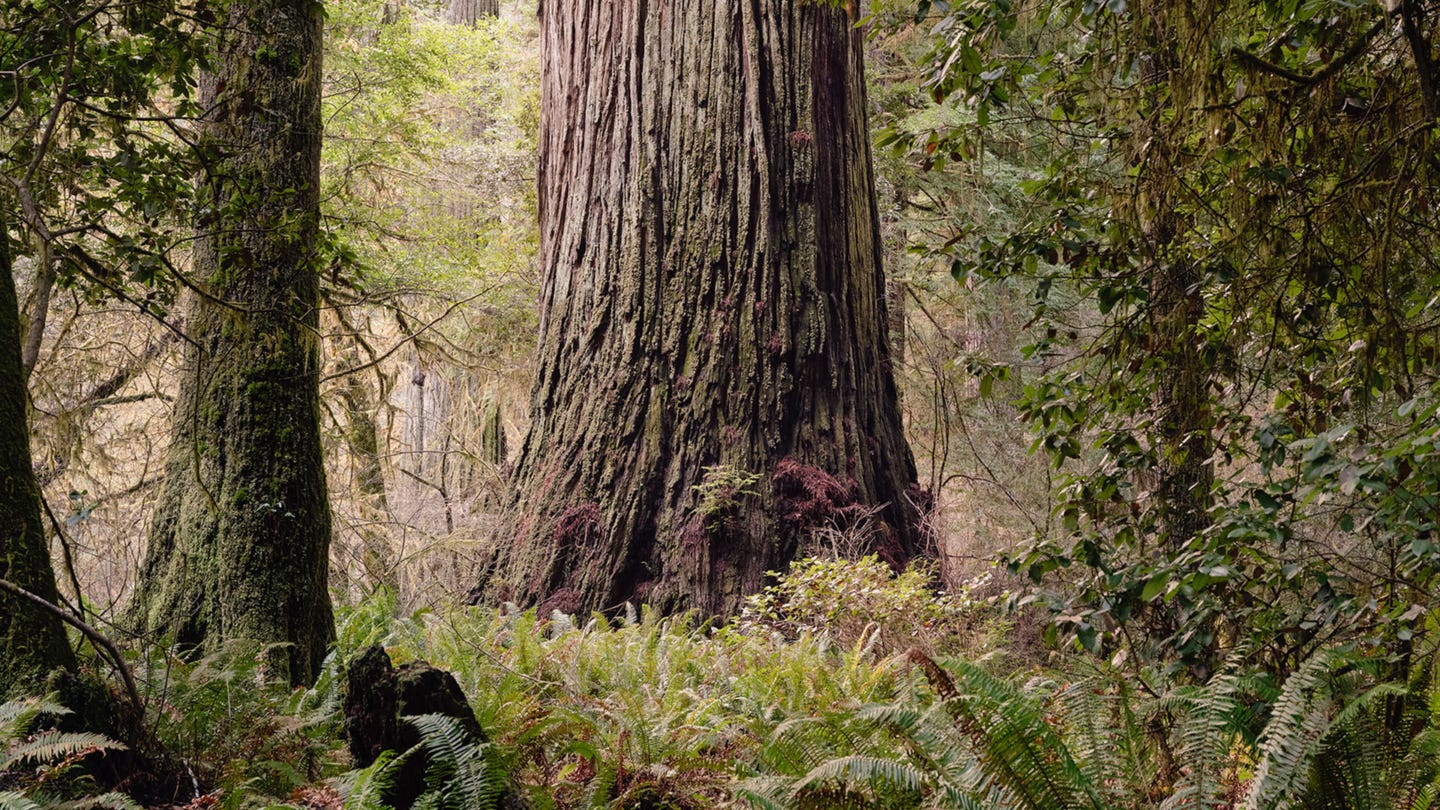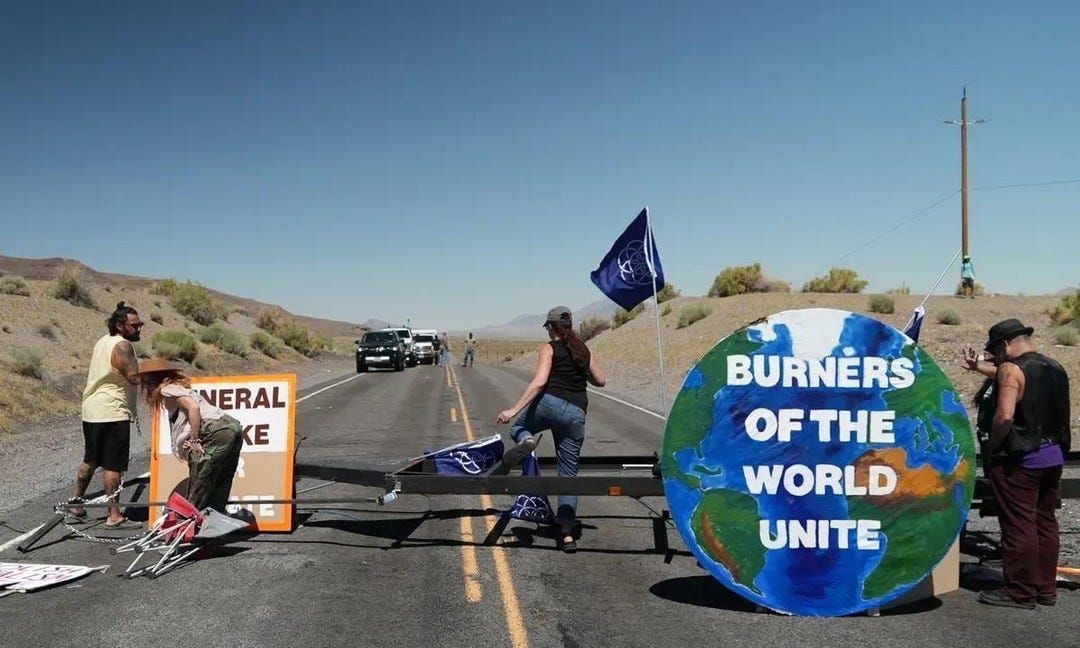"People vs Fossil fuel": Defending the Future 🌀
Center for Biological Diversity
We joined over 75,000 people the streets of NYC this past Sunday urging President Biden to end fossil fuel development and declare a climate emergency in the historic March to #EndFossilFuels.
Climate change is the single greatest threat we've ever faced — not only to human society but to the Earth's web of life. As the planet heats, people and wildlife suffer. In the race against the climate emergency, nothing matters more than rapid action by the United States to rein in the main driver of climate change: fossil fuels.
Couldn't make it to the march? Join us in urging President Biden to immediately exercise every power at his disposal to end the era of fossil fuels and stave off climate disaster.
Add your name here 👉
https://act.biologicaldiversity.org/oKoQssOnSU2K17OGmTsDLQ2?sourceid=1008915
THANK YOU!!
Over 75,000 of you joined the March to End Fossil Fuels on September 17th, making it the largest demonstration pressuring Biden since he took office and the largest climate mobilization since the start of the pandemic.
Our work isn't over! We still need President Biden to #EndFossilFuels - by stopping oil and gas projects, phasing down drilling, and declaring a climate emergency. Sign our petition amplifying these demands below 👇
https://actionnetwork.org/petitions/tell-president-biden-endfossilfuels-now
UN Climate Ambition Summit
20 September 2023, United Nations Headquarters, New York
Half of the world’s population is already living in climate danger zones, and those in climate hotspots are 15 times more likely to die from climate impacts. Close to 70% of all deaths from climate-related disasters in the last 50 years have occurred in the 46 least developed countries, but no person and no country is immune from the climate crisis.
On our current course, we are headed for levels that will destroy countries and economies, and even threaten human survival itself. By limiting temperature rise to no more than 1.5°C above pre-industrial levels and providing the means to adapt and protect, we can avoid the worst climate impacts and maintain a livable planet.
https://www.un.org/climatechange/climate-ambition-summit
THOUGHT LEADERS:
Loss and damage: A moral imperative to act
Tens of thousands in NYC march against fossil fuels as Alexandria Ocasio-Cortez hails powerful message
Tens of thousands of climate activists took to the streets of New York City on Sunday in a “march to end fossil fuels”, with Congresswoman Alexandria Ocasio-Cortez telling the crowd that the movement must become “too big and too radical to ignore”.
To cheers from the crowd, the progressive Democrat criticized the US continuing to approve fossil fuel projects, something which the Biden administration did earlier this year with the controversial Willow project in Alaska.
“We are all here for one reason: to end fossil fuels around the planet,” Ocasio-Cortez told a rally at the finish of the march, which ended close to the UN headquarters where world leaders will gather this week. “And the way we create urgency is to have people around the world in the streets.”
She said: “The United States continues to be approving a record number of fossil fuel leases and we must send a message, right here today,” adding that despite record profits the support for the fossil fuel industry was “starting to buckle and crack”.
Climate action requires a democratic restructuring of the economy, she said. “What we’re not gonna do is go from oil barons to solar barons.”
Organizers estimated that between 50,000 and 75,000 people attended the march in Manhattan and had anticipated it would be the biggest climate march in the US in the past five years. The NYPD said it did not comment on crowd numbers.
“This is an incredible moment,” said Jean Su of the Center for Biological Diversity, who helped organize the mobilization. “Tens of thousands of people are marching in the streets of New York because they want climate action, and they understand Biden’s expansion of fossil fuels is squandering our last chance to avoid climate catastrophe.”
She said the action was the largest climate protest in the US since the start of the pandemic.
“This also shows the tremendous grit and fight of the people, especially youth and communities living at the frontlines of fossil fuel violence, to fight back and demand change for the future they have every right to lead,” she said.
The march came as world leaders gather for this week’s UN general assembly, and a UN climate ambition summit on Wednesday, which the UN secretary general, António Guterres, has described as a “no nonsense” conference meant to highlight new climate commitments.
On Friday, the national security adviser, Jake Sullivan, said Biden was not currently scheduled to take part in Wednesday’s UN climate summit. Biden has been praised by climate activists for last year passing a historic $369bn climate law but criticized for allowing oil drilling projects and the expansion of gas facilities in the Gulf of Mexico.
A decision for Biden to stay away from the UN climate ambition summit is “unacceptable”, said Su of the Center for Biological Diversity. “The time is now for Biden to lead on the world stage, and show he means it when he calls climate change the existential threat to humanity.”
During the march, the Rev Lennox Yearwood, head of the Hip Hop Caucus, likened today’s climate movement to the US fight for racial justice. “We’re at our lunch counter moment for the 21st century,” he said. A native of Louisiana, he said he was excited to see demonstrators support environmental justice activists’ fight to end petrochemical buildout in the south-west US. “We need to end fossil fuels in all forms,” he said.
Youth climate activist Vanessa Nakate, from Uganda, said: “When we say that we want climate justice, we’re not just talking about transitioning to solar panels. We are talking about leaving no one behind when you’re talking about addressing the injustices that come with the climate crisis.
The actor and climate activist Susan Sarandon opened her speech by congratulating the students of New York University on the news of their university divesting from fossil fuels after years of pressure, as the Guardian first reported last week. Addressing the crowd, she said, “You guys give me hope,” adding: “What we have to do is take responsibility and press those that are at the top to finally step up.”
The veteran environmental activist Bill McKibben travelled to New York City to attend the march.
“I think it’s a real restart moment after the pandemic for the big in-the-streets climate movement,” he said. “It’s good to see people get back out there.”
The crowd, he said, reflected the diversity of New York City. “I’m glad to see there’s a lot of old people like me here,” said McKibben, who founded Third Act, an activist group aimed at elders. “We’ll be marching in the back because we’re slow!”
More than 650 global climate actions took place earlier this week; earlier on Sunday activists sprayed orange paint on to the Brandenburg Gate in Berlin, Germany.
Youth-led organizations, including Greta Thunberg’s Fridays for Future, played leading roles in organizing the mobilizations.
Additional climate protests will be held throughout the following week, including at New York City’s Zuccotti Park on Monday morning.
Explore more on these topics:
A climate high, a climate low, and our climate future
In these strange days of summer, we witnessed an extreme climate high and an extreme climate low. Both have significant implications for the planet’s health and for confronting the climate crisis moving forward.
The climate high
In a remarkable decision, a Montana District Court judge ruled that human-caused climate change poses a clear and present threat to human and environmental health. Even more extraordinarily, the case was brought by 16 youth activists ages 5-22. They argued that a provision in the state’s Environmental Policy Act–which prohibited any consideration of climate change in environmental reviews of energy projects– was unconstitutional. Specifically, it violated the Montana State Constitution which guarantees its citizens the right to a clean and healthful environment, including a stable climate. The plaintiffs made their case using the best available climate, energy, environmental, and health science as evidence. The judge found the case in their favor.
The precedent set by this historic ruling is likely to reverberate for years to come, both nationally and internationally. While only five other states in the U.S. have constitutional provisions with explicit environmental rights (Hawaii, Illinois, Massachusetts, Pennsylvania, and Rhode Island), nearly 150 national constitutions around the globe include explicit references to environmental rights and/or responsibilities. Explicitly defining and codifying the legal right to a healthy environment where these constitutional references exist would be an enormous step toward meeting the world’s ambitious climate and nature goals.
That is a climate high.
The climate low
We are all feeling the heat. July 2023 was the hottest month for global temperatures in recorded history. More worrisome, global ocean surface temperature also hit a record high. The world’s oceans have already absorbed 90 percent of the excess heat generated by man-made greenhouse gas emissions in the atmosphere and 25 percent of all carbon dioxide produced by human activity since the dawn of the industrial age. Record high temperatures in the ocean indicate the ocean’s diminishing capacity to buffer us from the impacts of increasing greenhouse gas concentration in the atmosphere.
In August, we saw the implications of that diminished capacity as increasing ocean surface waters promoted yet another tropical storm to a runaway hurricane with catastrophic outcomes for the historic town of Lahaina on the coast of the island of Maui in Hawai’i. The drought-stricken landscape choked by flammable, invasive grasses, combined with aging electrical, water, and building infrastructure and winds fueled by hurricane-force winds, allowed the development of the deadliest urban firestorm in the U.S. in 100 years. This disaster, like other contemporary climate-driven disasters around the globe, exemplifies the many ways we have unintentionally increased the probability of climate-driven events with unprecedented and catastrophic impacts. Failure to recognize this continues to make our communities more vulnerable to the impacts of climate change.
This is a very low climate low.
Climate + nature solutions for the future
While the factors that contributed to the Lahaina disaster are complex, they are not unsolvable. And in memory of those lost and missing in Lahaina, it is important that we focus on solutions. Solutions require buy-in from many sectors. We must decrease greenhouse gas emissions that contribute to climate change and use nature to mitigate climate change. This, in turn, will reduce communities’ vulnerability to climate-driven impacts and increase adaptivity within those communities.
World leaders will meet this month for Climate Week and the UN General Assembly in New York City. Now is the time for bold action that addresses the climate crisis and nature loss. We know transformative change is possible. Nations must follow through on the commitments they have made in the past and find innovative means to fund conservation and deliver nature-based solutions that address community needs and climate impacts.
Rebecca Shaw is WWF's Chief Scientist & Senior Vice President
https://www.worldwildlife.org/stories/a-climate-high-a-climate-low-and-our-climate-future
Dear Earth,
Patagonia / Sep 13, 2023
We have a lot to do, but we’re working on it.
It hasn’t been so very long since we took our relationship to a new level.
You were appointed our sole shareholder one year ago, which isn’t a lot of time on your geologic and cosmic timescales, something that’s easy to get existential about considering all you’ve done before we were even here. But let’s stay in the present. We see this as a moment of reflection and a moment for a greater human movement to rally on your behalf.
Days after we donated our company to you, we jumped wholeheartedly into the US midterm elections—it’s exciting for us to grant money in ways we couldn’t before. We supported campaigns in Nevada, Pennsylvania and Georgia in order to make progress on land and water conservation, as well as to defend our democracy, which we need to protect you and all the life you nurture. Catherine Cortez Masto, who won an important and very tight race in Nevada, has said, “Our democracy is precious, and we need to do everything we can to strengthen it,” an attitude that applies as much to votes as it does to conservation. There are many allies in this work, and now, under our new ownership arrangement, we can better support leaders like Cortez Masto.
It’s not just the most obvious threats of the climate crisis that need to be addressed. It’s also the protection of a toad that breeds at snowmelt in the Eastern Sierra; the carbon-capture potential of a New England forest; and the safe passage of species through human-impacted landscapes. This is why we were proud to help the Northeast Wilderness Trust in their successful bid to create a 1,400-acre wildlife corridor in upstate New York.
The value of “big little” wins is something our friends in South America have known for years, too. In 2023, the persistence of local and national advocacy groups in Chile and Argentina finally paid off. They won a 33-year-long fight to protect Peninsula Mitre at the continent’s southern tip.
In Alaska, the Dena’ina people led a successful effort to purchase conservation easements in Bristol Bay. These protect key salmon-spawning rivers and prohibit the building of access roads to the recently halted Pebble Mine project. You have to love that one—it protects the most vital salmon habitat left in what we call your Western Hemisphere.
The list of things to come reminds us of why we’re here, doing the work every day. We’re doing this work so that you can feel cool, clean, undammed rivers on your skin and listen to the sounds of millions of birds as they migrate around your circumference. So that you can watch seasons change in cyclical rhythms, rather than the chaos of too much change at once, and taste snowflakes on your tongue and feel the warmth of the sun on your hair. So that we can continue to experience awe at the things you continue to create, even under so much pressure.
There’s an election in 2024 that will have a huge impact on the political leanings of the US and, by extension, the climate policies we can enact. There’s a global biodiversity crisis we’re working to counter by advocating for marine protected areas and public lands, and by continuing our commitment to so many of the issues and fights we’ve been involved in for years—the Tongass, Bears Ears, the Vjosa River, the great forests of Australia.
Saving our home planet is still what we’re most invested in. But we also recognize that your forests and coral reefs and wild creatures will ultimately be fine without us. And that it isn’t finally about saving you at all, but about saving us. We need you. We need you to be OK. And we won’t stop working toward that.
Since the early days of our company, we’ve supported grassroots efforts to protect you. But our new way of doing things hopefully feels more like a partnership and serves to inspire others. We all have a role to play—join us.
https://www.patagonia.com/stories/dear-earth/story-142627.html
🔥#BurningMan’s principles of radical self-reliance and leave no trace seem to be at war with each other in the face of our new climate reality, especially when looking at the 100,000 tons of carbon dioxide that the festival generates, the extreme amount of trash left behind at this year’s flooded event and the impact it is having and will continue to have on local indigenous populations.
Listen to our latest episode to learn more about each of these impacts of the festival 🎧
https://earthtohumanspod.com/episodes/burning-man


